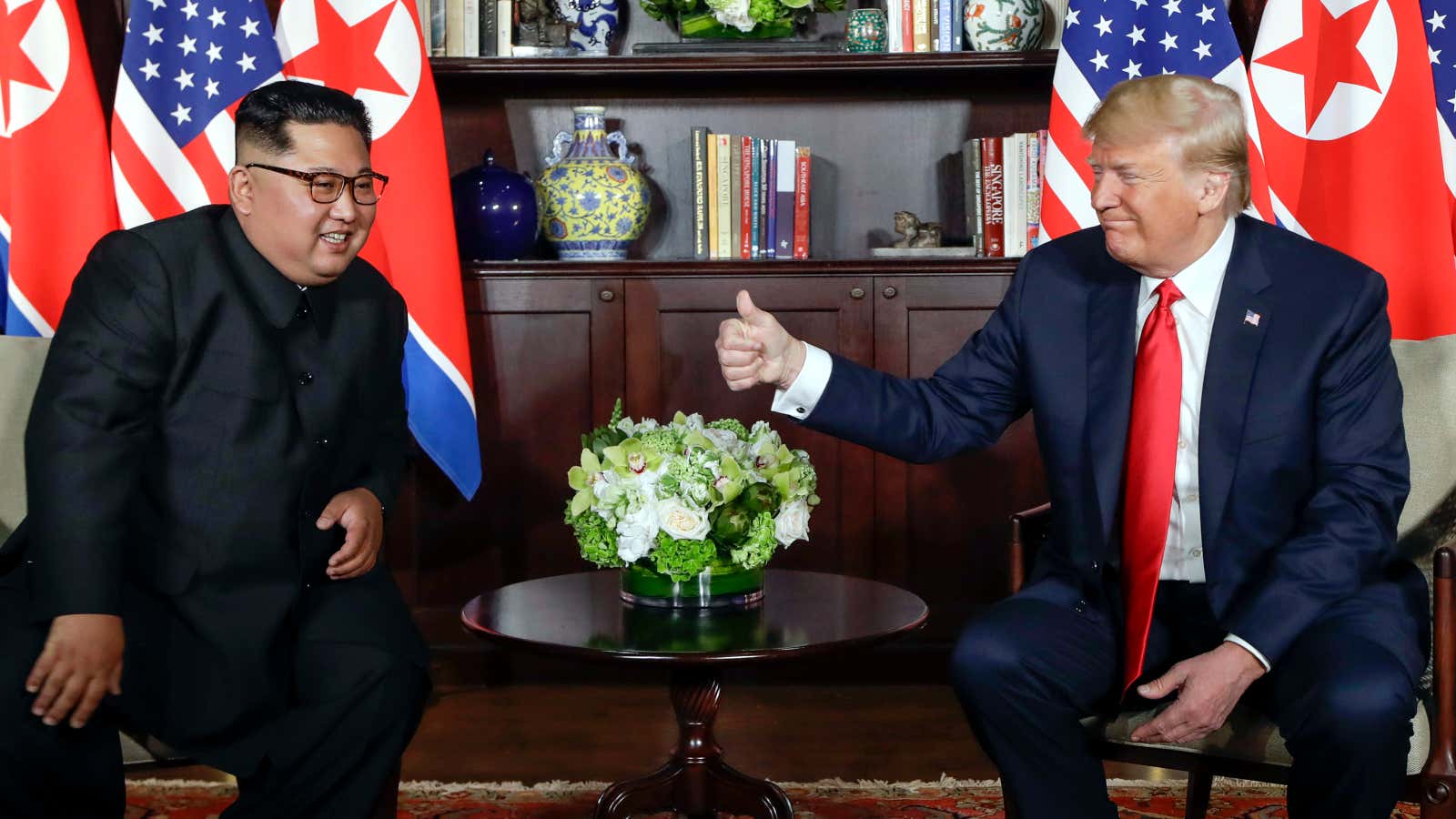A confidential UN report highlights North Korea’s global distribution of missile technology and chemicals weapons, including through a Syrian arms dealer and in the civil war in Yemen, according to Foreign Policy.
Why does it matter? This is exactly the kind of activity by Iran that last year led US president Donald Trump to unilaterally pull out of a global non-proliferation agreement with Tehran, known as the Joint Comprehensive Plan of Action (JCPOA) or simply the Iran nuclear deal.
US intelligence officials insisted that all their evidence showed Iran abiding by the JCPOA. But Iran continues to back terrorist groups and funnel money and resources into various proxy wars in the Middle East, and continues to develop ballistic missiles it says are limited to a range of 2,000 km (1,243 miles). With a dubiously binding annex of the JCPOA calling on Iran not to develop missiles at all, the US used it as proxy to pull out.
Yet in a matter of days, Trump will sit down for a second time with North Korea’s Kim Jong Un in Vietnam to talk about ending the latter’s pursuit of nuclear armaments while proclaiming they have a “great relationship.” But North Korea, as the UN document but also years of reporting and intelligence work confirm, is just as busy destabilizing the world.
Consider that North Korea continues to contribute technology and expertise to the very Iranian missile program that so upsets US officials. North Korea helped Syria develop the chemical weapons (paywall) used by Syrian strongman Bashar al-Assad. The regime’s security forces were behind the brazen assassination of Kim’s brother, Kim Jong-nam, in a Malaysian airport in 2017. And more than Iran, North Korea is suspected in costly cyber attacks, like a digital heist of Bangladesh’s central bank in 2016 or the attacks on Sony in 2014.
But on Feb. 13, US Secretary of State Mike Pompeo told CBS News that “North Korea behaves very differently. They’re not destabilizing Yemen. They’re not destabilizing Syria. They’re not conducting enormous assassination campaigns. These countries’ behaviors are different.”
It’s hard to say that’s truly the case. Arguably, Iran is closer to being a democracy and a rule-abiding member of the international order than North Korea. But the Trump administration’s foreign policy apparently sees North Korea as worthy of honey, while Iran gets the stick.
Part of the story may simply be Trump’s desire to reverse the work of the Obama administration, which inked the JCPOA with Iran but failed to achieve a diplomatic opening with North Korea. Now, Trump is bellicose toward Tehran and beatific toward Pyongyang. Trump and his staff also believe that the religion Islam is a unique threat to the United States, which colors their analysis.
It’s also difficult to extract US posture towards Iran from regional power politics. In the Middle East, the administration values its relationships with Israel, Saudi Arabia, and the Gulf States, all Iranian rivals, more than it does a consistent approach to nonproliferation or human rights. But in Asia, South Korea and China favor a diplomatic approach to North Korea, while Japan has taken a back seat in recent talks.
The problem with this inconsistent approach is that these talks are not taking place in a vacuum. Potential nuclear states keeping a wary eye on the US may deduce that their only protection is to develop nuclear weapons as fast as possible: Nuclear-armed Kim Jong Un is feted by the US while mere aspirants like the Ayatollah are sanctioned, and those without nuclear weapons—Libya’s Muammar Gaddafi and Iraq’s Saddam Hussein—are dead.
This is not an incentive that arms control experts think is helpful. And given the lack of any framework for a deal prepared before the summit—recall the years of complex negotiations that led to the JCPOA—few are expecting a concrete denuclearization deal to emerge from next week’s meeting between the two leaders. Given the danger of North Korea, they just hope it won’t get any worse.
